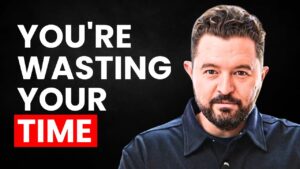“Building a smarter marketing agency doesn’t involve becoming the “agency of the Future,” selling marketing like a “mad man,” or aiming for 7-figures. Real growth could be as simple as employing this one agency model.” Posted on the DigitalMarketer.com blog.
Interesting article regarding: The Hollywood Model: Run Your Marketing Agency Like A Movie Studio by Mark de Grasse that I found on the DigitalMarketer.com blog.
*Caveat: All images, videos, audios & content are the property of their respective owners/authors. If they fail to appear because they have been moved or removed, you can here.

Building a smarter marketing agency doesn’t involve becoming the “agency of the Future,” selling marketing like a “mad man,” or aiming for 7-figures. Real growth could be as simple as employing this one agency model.
There are 3 things you need to stop doing in order to be an agency of the future.
STOP IT! #1: Stop Asking What the Agency of the Future Will Look Like
We’ve been talking about the agency of the future since 2009. Back when every agency NEEDED to start using QR codes or they were going to be left in the dust.
The “Agency of the Future” does not define itself by the SERVICES it offers, but instead defines itself by the markets it SPECIALIZES in and SERVES.
If you waste all of your time trying to figure out the next QR code, you’re going to be left behind. You’re going to miss the real focus which should be on serving your client and providing what they want and what they need. THAT is what you need to be focused on.
This means that you shouldn’t be asking yourself what services you should offer, instead, ask yourself WHO you should be serving. Your future agency will specialize.
The agencies who win will be the agencies who make their clients feel truly UNDERSTOOD.
What do all of your clients want… they want more sales. If you’re talking about fancy marketing words, you’re missing that connection.
You have to know who you’re serving if you want to make them truly feel understood.
Specializing does not mean that you only serve one, it means that you only talk to one at a time.
You need to make your clients feel that you understand them and their particular needs. It is not the case that every business is different, every CLIENT believes that their business is different.
If you want to serve your clients you must first give them what they want so you can earn the right to tell them what they need.
Step asking “what” the agency of hte future will look like and what you need to to worry about right now.
Start organizing your agency to better serve SPECIFIC markets and their SPECIFIC needs.
STOP IT! #2: Stop Trying to be a “Mad Man”

Mad Men isn’t just good TV, it tells the story of the marketing industry.
The opening pilot “Smoke in Your Eyes” talks about how the agency needed to find a way to come up with a hook to sell cigarettes AFTER they could no longer say that cigarettes were healthy.
How did they solve this problem with a simple pitch? They claimed that their client’s cigarette tobacco was “toasted.” The feature wasn’t anything special in cigarettes, but the “big idea” worked.
Later in the same episode the head secretary Peggy shows a new employee around the office, first stopping at the cool creative department, then to the slick-looking sales department, and finally to the ordinary-looking media buying room. Peggy then informed the new hire that the media buying room was where all the ACTUAL money was made.
To be a marketing firm back then meant that you were literally an “agent.” The goal was to pitch the client great ideas so that they could become the “Agent of Record” for placing the client’s media buys. Agents were allowed to enter into contracts on the client’s behalf. Marketing agencies required a big idea side, and a media buying side.
We believe that this classic “agency” model is starting to change because of automation, A.I. like Albert, and increasingly clever tools that put tools that used to be exclusive to marketing agencies into the hands of internal departments (or even low-paid interns).
The end results is that businesses are starting to fire their agents. This is bad for your agency, obviously.
Not to worry! Even if your current clients figure out their media buying needs, at least you still have the “big idea” to provide value, right?
Similar to media buying automation, figuring out what a market wants is getting increasingly easy thanks to tools like Answer the Public and BuzzSumo (among many, many more).
Your clients don’t need your market intuition, specialized market research, or your network to find fairly specific information about their target market. While the “big ideas” might not be as good or polished as yours, they could be a lot cheaper.
Even so, your media buying expertise and “big idea” acumen could save your agency, right?
Wrong. While automation and easily accessible tools may not ELIMINATE the need for “big ideas” and active media buying, it will almost certainly COMMODITIZE it.
Smart marketing agency expansion requires you to position your firm as a partner in growth, and not merely an agent for small businesses.
If you are seen as someone who comes up with a big idea, my fear is that you will be commoditized and replaced at some point.
If you are seen as the lever puller who ensures that traffic campaigns happen, my fear is that you will be commoditized and replaced at some point.
We are not agents. We are not negotiating contracts with big media buy companies. You are a partner in growth.
As Marcus Murphy said, “If small business is the backbone of the world economy, marketers are the backbone’s backbone.” I believe that is true, but only if marketing agencies are partners in growth.
How do you become a partner in your client’s growth?
You need to teach your clients about, and seek to own, their customers’ entire journey… the entire Customer Value Journey.

Do your clients see you as someone who merely helps others become aware of their business? As someone who just does their retargeting? As someone who just does their search?
Or… do you teach them that a relationship with the customer is a multi-step process, and marketing is involved with each and every stage of the process. As a result, if they want a continuous, seamless flow throughout the process they need to work with one agency to manage the process.
Are you teaching them that? They’re not going to figure it out on their own.
Can you do my facebook for me?
Can you handle my email marketing?
Can you get me ranking on Google?
If you say yes because you want that money, you will become a commoditized lever-puller only as desirable as the person who comes up behind who sounds like they can do the same work for a little bit less money.
You must teach them that it’s about a journey. It’s a process. It’s a relationship.
The key is that you need to TEACH. If you merely do the thing that the clients ask for, you are missing out.
Start teaching your clients (and their teams) about the Customer Value Journey, and position you and your agency as a true PARTNER in growth.
STOP IT! #3: Stop Trying to “Scale.”
Stop trying to go out, hire a billion people, and scale with a bunch of employees. It’s probably not what’s best for you.
Size is a liability. Hiring increases fixed OVERHEAD, which shifts the focus away from serving the clients you already have, and toward the ACQUISITION of new clients.
It’s a chicken and egg. You got all of these clients that you need to serve, so you need to hire a bunch of people… then guess what? Now that you have all these new employees you need more clients.
Why Not Just Outsource?
Outsourcing is a way to scale responsibly, right? If you think that you’re going to hire a huge team in India or the Philippines and everything is going to go swimmingly without you having done it before, it won’t. We’re not saying to avoid doing that… we’re saying that it’s not the answer TODAY.
Outsourcing still digs into MARGINS and makes maintaining STANDARDS difficult, if not impossible. If you want to make your clients feel understood, outsourcing makes doing that impossible.
The sad result is a reduction in specialization for the sake of scale, which leads to an increase in commoditization, which leads to mechanization… at which point your agency becomes a replaceable cog in a heartless machine.
This doesn’t have to be your result. You don’t have to become this for the sake of scale. The problem is that if you’re left to your own devices this is what you might become.
Who has the solution to becoming a “heartless machine?” Believe it or not, Hollywood has the solution to your marketing agency’s growth.
While Hollywood is the pinnacle of the heartless machine, if you look at how they model their business there’s a lot to learn.
The Three Types of Marketing Agency
There are 3 organized models that you get to choose to run your agency from nowadays:
| Gig Model | Short-term tasks that can be managed by one, or at most, a handful of people. Your business runs project-to-project and you’re focused on excelling at each of those projects—and then moving on. This model works great for startups that can’t afford full-time employees yet and are still getting themselves off the ground. |
| Corporate Model | Hire a team to work on long-term open-ended jobs that can last for years. This is what you picture when you think of an office… lots of computers and people. We’re thinking of water station conversations and in-person team happy hours. This model is an inevitable transition once your business requires some full-time staff. It usually starts by bringing on some sort of operations or marketer—and quickly turns into full-time HR people, office managers, and interns. |
| The Hollywood Model | Stay lean and bring in the best people on a project basis. This means that you have some full-time employees and the rest of your workforce are contractors/freelancers/gig workers (all the same thing). |
How The Hollywood Model Works

Most Hollywood studios, if you were to look at the revenues that they generate versus the number of people that they have on full-time staff, are proportionally tiny when compared to other corporations. Why?
“A project is identified, a team is assembled, it works together for precisely as long as is needed to complete the task, and then … the team disbands.”
Adam Davidson, Co-founder of NPR’s “Planet Money”
This method of managing projects could be the future of your marketing agency.
Here are the key roles of Hollywood productions.
Role #1: The Producer (aka the Client)
This is the person funding the project who expects a positive return on investment. Chances are they’re just putting up the money, handing it to the director (which we’ll go over next), and focusing on their next problem to solve.
Role #2: The Director
This is the person who owns the entire journey and coordinates the process. They’re your Steven Spielberg—and you know they’ll hire the right people to make the best movie (or in your case deliverables) as possible. Their job is to make sure the right employees are working on the project and the right freelancers are hired.
Role #3: The Star
The spokesperson/face of the brand. This is the Star that gets people interested in what your agency is delivering. Just like everyone runs to go see the next Leonardo DiCaprio film, you want a face of your agency to be someone that people know, like, and trust.
Role #4: The Specialists
The Specialists are outside teams/consultants brought in to perform specific tasks. Think of Miles Finch from Elf—he’s a best-selling children’s book author who gets paid to come in and help ideate a better story for Greenway Press’ upcoming children’s book. These are your freelancers/gig workers who you have on retainer or hire per job to do their magic.
Role #5: Supporting Cast
These are the people who help the project’s progress, without necessarily having the specific skill set of the freelancer/gig worker. While the Director focuses on the macro project, they’re focused on the micro.
Which Roles Do You Provide in the Hollywood Model?
| The Producer The Client |
| The Director The Full Service Agency |
| The Star The Marketing Consultant |
| The Specialists Specialist Agency |
| Support Cast Ideally the client’s in-house team since you are trying to avoid adding overhead. |
From a role perspective you need to be a Director, or a Specialist working with a Director.
The smartest marketing agencies will not build a massive IN-HOUSE team, but instead will learn to work with OUTSIDE specialists, as well as the client’s own team.
So again, stop trying to “scale.” Start building your specialist network.
There are agencies that have your clients, and they DON’T want them. Your crazy client is another person’s dream client.
Start training and up-leveling the “supporting cast” that is already on your clients’ payroll. Let them grow their overhead so you don’t have to.
If you are working with clients with good marketing team, you don’t need as many people on your team. That is the key/secret to scaling your agency. Don’t scale your payroll, encourage your client’s to scale theirs. They’ll be encouraged and incentivized to do that because you’re going to be growing their top line.
How Do You Get Started with the Hollywood Model?
You become a Certified Partner. You get instant access to an amazing network of marketers that will help support and train you in becoming the Director or Specialist of your choosing.
If you are interested in scaling your marketing agencies there are lots of options like the one above. If you’d like to see the breakdown on how we help agency owners scale to $336K a year…part time…join us for this webinar here.
What do you think? Share your thoughts in the comments below! If you would like to check the source or if the respective owners have moved the images, etc., displayed in this article, you can see them here.
The Hollywood Model: Run Your Marketing Agency Like A Movie Studio
#DigitalMarketing #InternetMarketing


